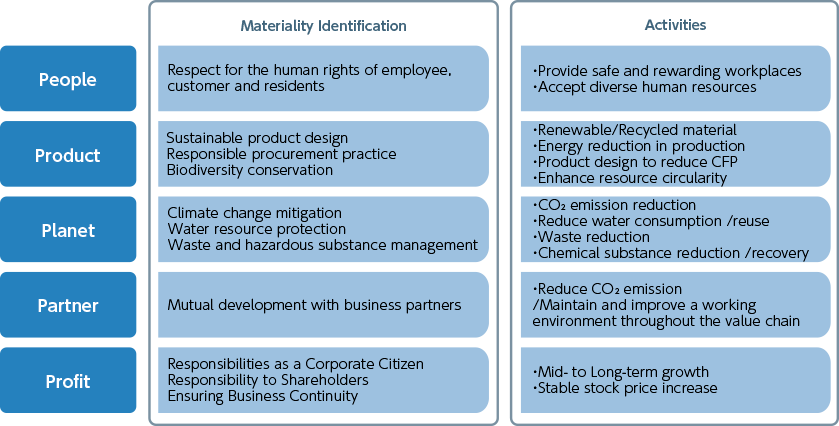Materiality
Key areas expressed by five “P’s”
Our Group’s Management Philosophy includes a mission “to contribute to society by emphasizing sustainability.” We believe that delivering the value we create to various stakeholders such as customers, end-users who actually use our Group’s products in furniture and automobiles, business partners, employees, shareholders, investors, and local residents, and ensuring their satisfaction, will ultimately lead to sustainable growth of our corporate value and contribution to society. To this end, we have established the five “P’s” (People, Product, Planet, Partner, and Profit) as the key areas of focus, and will continue to promote our Group’s sustainability activities.
Establishment of Materiality and Individual Themes
We have identified materiality (important issues) to be addressed in each area, based on international guidelines for sustainability reporting such as GRI Standards, investor concerns, and the opinions of external consultants, as well as discussions with internal and external directors. In addition, specific actions to address the materiality have been set as individual themes.

“People” refers to all people involved with our Group, including employees, customers, and local residents, and we believe that respecting the rights of these people to live safely and comfortably is an important issue we must address. As individual themes to achieve this, we have set the provision of safe and rewarding workplaces and the acceptance of a diverse workforce in terms of gender, race, disability, etc.
In terms of “Product,” we intend to further promote the characteristics of our Group’s products, which are animal-free, lightweight, and easy to clean with a long life. The issues identified as being material are as follows: sustainable product design in raw materials and manufacturing processes; minimizing the impact on the environment and society as much as possible in raw material procurement; and contributing to the maintenance of biodiversity. As individual themes, we have set the following: promotion of the use of bio-based/recycled materials, reductions in energy consumption during product use, product design for CFP reductions, and promotion of product recycling.
We consider “Planet” is the most important issue to focus on in the promotion of sustainability, with the following identified as being material: mitigating climate change; protecting water resources; and managing waste and hazardous substances, which are now common issues worldwide, as not only our Group but also the entire value chain wants to be friendly to the global environment. We will vigorously pursue reductions in CO2 emissions, reductions in water consumption/reuse of water, reductions in waste, and reductions in chemical substance consumption/recovery of chemical substances as individual themes.
For “Partner,” the issue we have identified as being material is building mutually developed relationships with business partners, especially suppliers who supply raw materials to our Group, and as individual themes, we have set reducing environmental impact throughout the value chain and maintaining and improving the workplace environment.
Finally, for “Profit,” in order for our Group to contribute to society as a listed company, it is important to fulfill our responsibilities as a corporate citizen, such as paying taxes and complying with laws and regulations, to fulfill our responsibilities to shareholders, and to maintain stable business operations. Specifically, we believe that mid- to long-term corporate growth and a stable rise in share prices are required.
Establishment of KPIs
In order to measure the progress of our efforts toward materiality, we have established various KPIs and disclose the measured values. We have already set targets to be achieved for the KPIs listed below, and are currently working to set specific targets for other KPIs as well.
| KPIs | Targets | Achievement status in FY 2024 |
|---|---|---|
| Reduction in GHG emissions | Reduce GHG emissions (Scope 1 and Scope 2) by 42% compared to FY2021 levels by FY2030. | 18.5%Reduction |
| Products with environmentally preferred materials | Ensure all products contain at least 50% environmentally preferred materials by FY2030 | 100% achieved among products for furniture, aircraft,RVs, and cruisers |
| Reduction in water consumption | Reduce water consumption per unit requirement by 20% compared to FY2020 levels by FY2025. | 11.7% Reduction |
| Waste rate | Maintain the ratio of products unsuitable for sale generated during the process from manufacturing to sales and returned products to production volume at 3% or less. | 1.3% |
